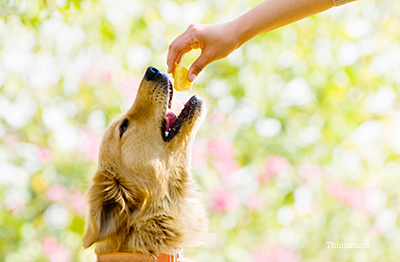
We often hear about foods we can’t share with our dogs: chocolate, grapes, raisins, fatty foods, onions, foods with the artificial sweetener xylitol, macadamia nuts, etc.
With so many “don’ts,” what human foods can we share with our dogs? Are any human foods safe for our dogs?
The answer is yes! Here is a list of some human foods that are yummy and generally good for your dog:
[Editor’s Note: Always consult your veterinarian before making any changes to your dog’s diet.]
Lean meat
- Besides being a great source of protein, dogs love to eat meat. In order to prevent an upset stomach, or worse yet—a pancreatitis—it is safer to feed dogs lean meats such as turkey, chicken, and fish. Fish is not only a good source of protein, but can also be a great source of omega-3 fatty acids—especially salmon. Omega fatty acids are purported to have anti-inflammatory properties, are a major component of the mammalian brain, and can help with skin and coat problems. When giving your pets meat, remember to remove the skin and fat; if it’s not healthy for you, it’s not healthy for your dog. Finally, be sure you also remove all bones. Beef bones can chip a tooth, poultry bones can splinter, and any bone can get stuck in your dog's throat or intestinal tract.
Veggies
- Vegetables can be a healthy and tasty treat for your dog. I know a lot of dogs that enjoy carrots, broccoli, and sweet potatoes. Carrots are rich in beta-carotene and dietary fiber. They can be served raw or cooked. Many dogs enjoy the crunchy texture of raw carrots. An additional benefit is that their hard texture can help keep teeth and gums clean. Other dogs prefer cooked carrots mixed into their food. Broccoli is rich in vitamin C, dietary fiber, and other nutrients with anti-cancer effects. Like carrots, it can be served raw or cooked. In my experience, most dogs prefer broccoli steamed and mixed in their food. Sweet potatoes are loaded with complex carbohydrates, dietary fiber, and beta-carotene; and are a good source of vitamin B5, vitamin B6, manganese, and potassium. The great thing about vegetables is that they are low in calories and high in vitamins, minerals, and fiber.
Fruit
- Many dogs like apples because of the crunchy texture. Apples are not only “Red Delicious,” but also healthy and a good source of dietary fiber and vitamin C. Just make sure your dog doesn’t eat the core (a choking hazard); also avoid the seeds--they contain cyanide. Bananas are another fruit-treat you can give your dog. Bananas are rich in vitamin B6 and soluble fiber and also contain moderate amounts of vitamin C, manganese, and potassium.
Grains
- You can supplement your dog’s diet with rice, preferably brown rice. In fact, most veterinarians recommend a temporary diet consisting of chicken and rice for dogs with acute gastrointestinal problems. Brown rice is loaded with dietary fiber; minerals like manganese, magnesium, phosphorous, zinc; and vitamins such as vitamin B1, vitamin B3, vitamin B5, and vitamin B6. Flax seeds can also be given as a healthy treat. Flax seeds are a great source of omega fatty acids and dietary fiber.
If you have an overweight dog, substituting one of these healthy veggies or fruits for treats can be a great way to reduce his calories without you feeling like you are denying him. Let’s face it; we all like to give our dogs treats. Unfortunately, treats have calories that add up quickly. Fruit and veggies are a low-calorie alternative.
This list is meant to give you ideas about foods that you can safely share with your dog. It is neither exhaustive nor meant to be a substitute for a formulated diet. Dogs have very complex nutritional requirements. It is never advisable to give your dog “home cooked meals” without first consulting with your veterinarian. If you are interested in cooking meals for your dog, hopefully, I have given you some ideas that you can bring to your veterinarian to create a well balanced diet. Of course, if your dog has a medical condition, your veterinarian will want to consider that before adding anything to his diet.
If you have any questions or concerns, you should always visit or call your veterinarian -- they are your best resource to ensure the health and well-being of your pets.
